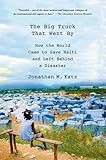One of the reason he touches is that emergency relief groups like the Red Cross (and other, e.g. MSF) aren't setup to do the nation-building Haiti actually needed, but for more rapid and short term support as is needed in war zones, refugee camps or rural disaster areas (tents, water, food etc.).
I can only recommend the book. I found it through his article on the NYTimes [2] which touches most points.
Most embarrassing for a journalist, they were wrong in ways that would have immediately been made clear had we taken the time to ask some basic questions.
Food and water, for example. When I was in Haiti two years later, to research the relief effort for a book, I was shocked to discover that no one could tell me with any precision if there was ever a food or water shortage in the first place. No one among the responders had even contacted the Coordination Nationale de la Sécurité Alimentaire — the Haitian government agency overseeing food security — to find out what might be needed. Indeed, earthquakes tend to inflict the worst damage on cities, not farms — especially in countries that already have limited infrastructure — and Haiti’s urban areas didn’t have any sewers or piped drinking water to begin with.
People indeed lost their homes and incomes, and markets closed. But the World Food Program had enough supplies in its Port-au-Prince warehouses — which survived the quake — to feed 300,000 people one full meal for three weeks. There was no acute food or malnutrition crisis after the quake; that much we know. But it seems very likely that the city could have avoided one even without the frenzied aid push.
[1] http://www.amazon.com/The-Big-Truck-That-Went-ebook/dp/B009O...
[2] http://www.nytimes.com/2015/04/28/magazine/how-not-to-report...


That said, according to our sources -- about a dozen current and former Red Cross employees -- and a bunch of internal documents, many of these problems were of the Red Cross' own making. Sometimes it was basic issues like leaving key jobs unfilled for months. Or prioritizing public relations concerns over aid. But a lot of it flowed from the fact that the Am Red Cross doesn't do international development and no roots in Haiti. The more successful groups tended to be the ones that had roots there, had Haitians in high positions, etc. As for the next big disaster: I think it's case by case. Look for groups in the country in question -- whether actual local groups or foreign groups who have been there for a long time and have deep ties.